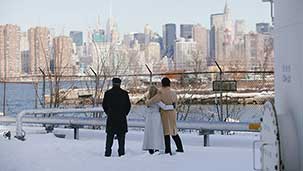1981 was a year I would like to forget. I was 19, badly dressed, and listening to some of the worst music the Western world has ever created. But thanks to you and director J.C. Chandor—as well as art director Doug Huszti—I now will never be able to erase those stains from my memory. You have etched that year and its sensibilities into my brain forever.
I forgive you that unwanted imposition because A Most Violent Year is note perfect in tone. The fidelity of its depiction of a particular period is only one of the things that make this film close to flawless. Choosing Oscar Isaac as the almost impossibly stubborn Small Business Owner/ Protagonist (of an oil distribution company no less), Jessica Chastain as his wife and business partner, and Albert Brooks—in a role originally intended for Stanley Tucci—as their family lawyer was also touched with a quiet genius.
Set in New York, it also evokes a period that was formative for me in my love of films. This is the dirty, knockabout New York of The French Connection, a time before the whole city was castrated by Disney and it adherents. Smoky back rooms filled with a remarkably diverse cast of players, engaged in the some of the most Machiavellian examples of business relationships.
The world that these people inhabit is made seamless and utterly believable by the maturity of the script, the nuanced and incredibly competent direction, as well as a cast that never takes a wrong step. It is also a cast that has a Guatemalan/Cuban lead, features an African man as an incorruptible authority figure, and a woman who is not only the equal of her husband in every way but also the spine of their shared business. All of these components simply exist, they are never underlined or trumpeted but are simply part of the tapestry.
And then there is your contribution.
From the clothes to the cars to the architecture to the choice of locations, you managed to capture a New York made of rusting steel, wood paneling and slightly ludicrous wardrobes. The tans and washed-out polyester tones, the overly styled hair and nouveau riche sensibilities contrasting with the stripped down aesthetic of an industrial park were pitch perfect. This is a New York in transition, spiritually, economically and demographically. And it is a painful transition.
There has been some comparison of this film to Coppola’s Godfather pictures, largely because of the themes of dynasty and violence that permeate A Most Violent Year. But I think a better point of reference is Sidney Lumet. His films so often had as their central theme a struggle between expedience and doing what was right. Think Serpico or even 1981’s Prince of the City. Set in this New York with these kind of ethical quandaries at their centre, they were mature, thoughtful films filled with real characters, facing the often mundane complexities of life.
That is not to say A Most Violent Year is simply pastiche, but the pedigree is far more Lumet than it is Coppola. There is something distinctly un-operatic and kitchen-sink to this film that makes it more realist than impressionistic. It is a film about people first and then it engages its larger themes.
Except.
Perhaps you and Chandor decided that, like Japanese artists who create an intentional flaw in their work, you needed to remain humble. That is the only reason I can fathom for the clunky, tacked on nature of the epilogue. It stood out like cotton in a disco and came close to unraveling all you had built. I hope against hope it simply disappears in the DVD version.
Still, this was a film that is otherwise a masterpiece of what I hope cinema is moving towards again—a balance between the tentpole Gotterdammerung of the summer and quietly brilliant character studies like A Most Violent Year. That would be the best of all possible worlds. And I truly appreciate your efforts in trying to make that a real place we can all inhabit.
Sincerely,

Tim








